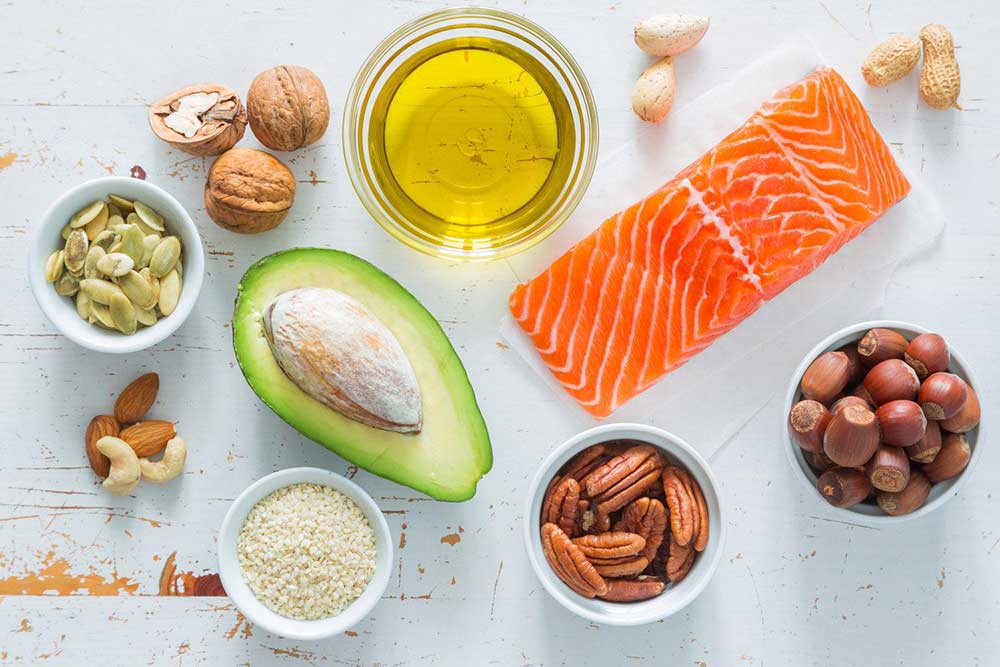Many of our patients come to Culina Health seeking to transform their physical health—whether they hope to ease symptoms of a chronic condition, improve lab results, or simply to live a healthier, more active life. But that’s not all nutrition can do. Emerging scientific evidence suggests that what we eat can directly impact our mental health, and that we can improve our mental wellbeing by eating diets rich in certain nutrients.
We tapped Culina Health RD Tara Maurice to answer some commonly-asked questions around the link between nutrition and mental health. Read on for actionable advice and takeaways to understand how a balanced diet can support better mental health outcomes!
How does nutrition affect mental health?
Nutrition plays a crucial role in brain function and mood regulation. Nutrient-rich diets can support mental health by providing the essential vitamins, minerals, and fatty acids needed for neurotransmitter production and brain health. Feeding our bodies with the fuel they need helps improve our quality of life. In the spirit of keeping our efforts sustainable and not restrictive, I urge my patients to aim for an 80/20 split of balanced, health-promoting foods and meals. Eating a small to moderate amount of “indulgent” foods may not provide nutrient density, but may be meaningful to our social connections and taste buds!
What nutrients are important for mental health?
There are a few core nutrients that are essential to our mental health. Incorporating these into your diet (more on how to do that below!) will support brain health and mood regulation.
Omega-3 fatty acids
Omega-3 fatty acids are involved in a wide range of physiological functions that are related to neurogenesis, neurotransmission, and neuroinflammation; therefore, they play fundamental roles in the development, functioning, and aging of the brain. They have also been shown to reduce inflammation and increase serotonin activity.
B vitamins
B vitamins support brain function and the production of neurotransmitters that affect mood. What’s more, low levels of certain B vitamins have been linked to depression and other mental health issues.
Magnesium
Magnesium (Mg) helps to reduce the stress hormone cortisol, potentially relaxing the mind and muscles, even aiding in a restful night’s sleep. Mg activates your body’s natural melatonin which helps you get to sleep faster without causing grogginess in the morning. There are a few different types, but magnesium glycinate is usually recommended to help relieve stress and anxiety.
Zinc
Zinc can help to reduce symptoms of anxiety and depression for some people. Supplementation with zinc has been proven to be effective in the treatment and reduction in symptoms for people with depression.
Vitamin D
Vitamin D activates the receptors in our brain that control our emotions and behavior. It also promotes serotonin, which may increase happiness and help stabilize how we feel. It may also help improve memory and attention span. For pregnant women, vitamin D helps support the baby’s brain development, too. Furthermore, optimal vitamin D levels protect against oxidative stress, which negatively impacts mental health.
What are the best foods to support mental health?
Fatty fish
Fish like salmon and mackerel are packed with beneficial nutrients. They are rich sources of omega 3 fatty acid and vitamin D, which have been shown to reduce anxiety and depression symptoms. A 3.5 oz serving of wild salmon provides an impressive 124% of the daily value for vitamin D. Salmon also contains vitamin B12 and the amino acid tryptophan, which aid in the production of brain chemicals associated with a positive mood.
Leafy greens
Greens like spinach and kale are rich in the essential mineral magnesium, which plays a vital role in influencing serotonin levels in the body. Research demonstrates that individuals with low serotonin levels are often deficient in magnesium too, and they may experience increased anxiety and depression.
Nuts and seeds
Walnuts and chia seeds are rich sources of essential omega-3 fatty acids, which may reduce the risk of mood disorders and fight depression. They are both great sources of antioxidants, which protect brain cells from stress and inflammation.
Whole grains
Whole grains like quinoa and brown rice are high in fiber, which promotes optimal gut health and digestion. A healthy gut and optimal digestion have both been linked to lower levels of anxiety, depression and stress.
Fermented foods
Fermented foods like yogurt and kimchi contain probiotics, which are critical to maintaining a healthy gut. They have also been shown to reduce stress and anxiety.
Can certain foods help reduce anxiety and depression?
Yes! Foods rich in omega-3 fatty acids, magnesium, and B vitamins, such as fatty fish, leafy greens, and whole grains, have been shown to help reduce symptoms of anxiety and depression.
Are there foods that can negatively affect mental health?
Overconsumption of highly-processed foods, sugary snacks, and beverages, as well as foods high in trans and saturated fats, can negatively impact mental health. This is because these ingredients contribute to inflammation and poor brain function. Furthermore, habits like irregular meal timing, skipping meals and under-eating can contribute to inconsistent blood sugar levels. Inconsistency in blood sugar can affect focus, attention, increase stress and anxiety, and make you feel “hangry.”
Can improving my diet improve my mental health?
Improving your diet can positively impact your mental health by reducing inflammation, improving gut health, and ensuring your brain gets the nutrients it needs to function properly. A few nutrients to add into your diet include:
Protein
Protein contains amino acids, which the brain uses to produce neurotransmitters that regulate mood and feelings. Meat, fish, eggs, nuts, seeds, legumes, and soy products are all excellent sources of protein.
Whole grains
Whole grains are high in fiber which promote optimal gut health and digestion, both of which are linked to lower levels of anxiety, depression and stress.
Fruits and vegetables
Fruits and veggies contain a multitude of essential vitamins, minerals and antioxidants, which help reduce inflammation and strengthen the immune system. Eat the rainbow!
Healthy fats
Unsaturated fats, often referred to as healthy fats, are essential for brain function (think Omegas), are anti-inflammatory and also are needed to absorb other fat soluble vitamins (A, D, E & K).
Is there a connection between gut health and mental health?
Yes, the gut-brain axis links gut health to mental health. A healthy gut microbiome can positively influence mood and cognitive function. Conversely, an unhealthy gut can contribute to mental health issues. The gut contains billions of bacteria that produce chemicals like dopamine and serotonin that carry messages from the gut to the brain. Eating nutritious foods promotes the growth of “good” bacteria, which can positively affect mental state.
Gut bacteria also produce hundreds of neurochemicals that the brain uses to regulate basic physiological processes as well as mental processes such as learning, memory and mood. Gut bacteria manufacture about 95 percent of the body’s supply of serotonin, which influences both mood and GI activity. Fermented foods help increase the number and diversity of gut bacteria. More diversity in gut bacteria leads to a healthier gut, which results in improved mental health.
Should I take supplements to improve my mental health?
Supplements can be beneficial if you have specific nutrient deficiencies, but it’s important to consult with a registered dietitian or healthcare provider before starting any supplementation. If you’re feeling like you aren’t getting adequate nutrition despite a balanced diet, here are 5 supplements I would recommend:
B vitamins aid in neurotransmission funcion, psychological health, energy production and overall brain health.
Vitamin D activates the receptors in our brain that control our emotions and behavior. It also promotes serotonin, which may increase happiness and help stabilize how we feel.
Magnesium plays a part in hundreds of metabolic reactions, one of which is to help to reduce the stress hormone cortisol. Lowering cortisol can potentially relax the mind and muscles, even aiding in a restful night’s sleep.
Omega-3 fatty acids support a wide range of physiological functions that are related to neurogenesis, neurotransmission, and neuroinflammation. Therefore, they play fundamental roles in the development, functioning, and aging of the brain.
How can I tailor my diet to support my mental health during stressful times?
Tip #1: Focus on a balanced diet rich in whole foods, stay hydrated, and avoid excessive intake of caffeine, alcohol, and sugar. Incorporating stress-reducing foods like leafy greens, nuts, and fatty fish can also help.
Tip #2: Work on stress management skills. This will greatly impact on your ability to stick to a balanced diet in times of stress. Deep breaths, going for a walk and even listening to music are all ways to settle the nervous system instead of grabbing a sugary treat or another cup of coffee.
Tip #3: Stick to regular meal timing. Combine protein and carbohydrates with meals/snacks. This will help stabilize blood sugar and decrease the chances of sugar cravings.
Work with a Culina Health Registered Dietitian
One thing to take away from this information? It’s the power of food—not only to transform your body, but also your mind. For more personalized advice on how to support a healthy mind and body through nutrition and lifestyle strategies, visit our website to get matched with a Registered Dietitian who fits your needs. You could pay as little as $0 per session with insurance!






